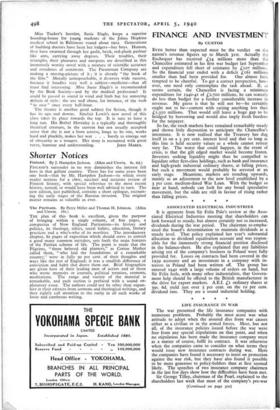FINANCE AND INVESTMENT
By CUSTOS
EVEN better than expected must be the verdict on the nation's revenue figures up to March 31st. Actually the Exchequer has received L54 millions more than the Chancellor estimated in his first war budget last September and expenditure fell short of estimates by £107 So the financial year ended with a deficit £161 millions smaller than had been provided for. One almost feels tempted to be cheerful. To get a correct perspective, how- ever, one need only contemplate the task ahead. If, as seems certain, the Chancellor is facing a minimum expenditure for 1940-41 of £2,700 millions, he can scarcely do less than budget for a further considerable increase in revenue. My guess is that he will not be—he certainly ought not to be—content with raising anything less than £1,350 millions. That would still leave a huge gap to be bridged by borrowing and would also imply fresh burdens for the taxpayer.
So far, the stock markets have remained remarkably steady and shown little disposition to anticipate the Chancellor's intentions. It is now realised that the Treasury has dug itself in on a 3 per cent. interest level and that so long as this line is held security values as a whole cannot retreat very far. The worst that could happen, in the event of crisis, is that the gilt edged market would become frozen. Investors seeking liquidity might thus be compelled to liquidate other first-class holdings, such as bank and insurance and high-grade industrial ordinary shares, at falling prices, but such a movement would probably be arrested at an early stage. Meantime, markets are trending upwards, mainly as an adjustment to the new level established by a 3 per cent. medium-dated War Loan. With the budget so near at hand, nobody can look for any broad speculative movement, but the odds are still in favour of rising rather than falling prices.
* * * *














































 Previous page
Previous page